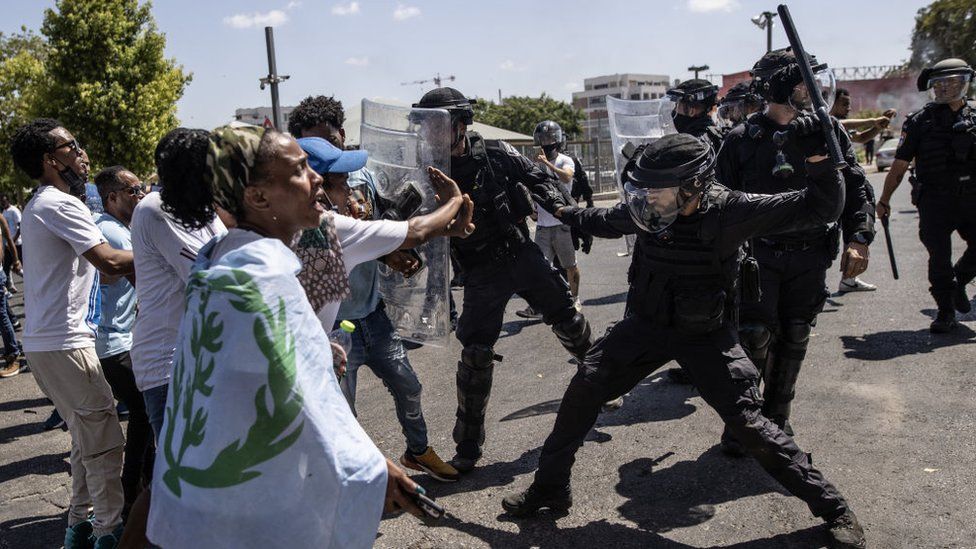Dozens of people have been injured, including some from live gunfire, during clashes between Eritrean asylum seekers and Israeli police in Tel Aviv.
Stun grenades, tear gas and sponge-tipped bullets were used against hundreds of protesters.
The unrest was sparked after activists opposed to the Eritrean government said they asked Israeli authorities to cancel an embassy event on Saturday.
But protesters also clashed with supporters of the Eritrean regime.
The divisions within Eritrea over the rule of President Isaias Afwerki have spilled over into the diaspora, and this is the latest outbreak of violence in recent weeks.
According to Israeli news reports, the demonstrators marched towards a venue where the event was due to take place. They were initially held back by police barricades but later managed to break through them.
Residents said the streets of central Tel Aviv sounded like a war zone as police helicopters buzzed overhead and Israeli officers fired live rounds into the air.
Protesters fought with police, damaged cars and smashed the windows of nearby businesses.
A statement by Israeli police said that officers used their guns as they felt their lives were in danger.
Photos from inside the hall that had been hired by Eritrean diplomats for the event showed tables and chairs overturned after angry demonstrators broke in.
Videos shared on social media also showed street battles between Eritreans who support the regime in their home country, and those who oppose it. Israeli police said they tried to separate the two sides.
In a message put out on X, previously known as Twitter, the police asked uninvolved members of the public to stay away from the scene.
- Eritrea country profile
Earlier this week, police said at a news conference that different Eritrean factions had agreed to rally in two separate locations this Saturday.
Supporters of the government in Asmara were supposed to meet close to the embassy venue. Opponents were due to protest at the old central bus station, which is a short distance away.
However, the two sides did not stick to their commitments, police said.
An unnamed senior police source was quoted by the Haaretz newspaper as saying: “We were very surprised by the level of violence, scenes you only see in the West Bank.”
Hundreds of officers have since been deployed in the area, according to the police.

In the middle of the afternoon, the Magen David Adom emergency medical service said it had treated 114 wounded people. Most had minor injuries, including 30 police officers – most of whom were badly bruised. Eight were in a serious condition and 13 in a moderate condition.
There have been previous cases of violence between different factions of Eritrean asylum seekers.
In 2019, one asylum seeker who was a regime supporter was fatally stabbed in south Tel Aviv amid a turf war – between those for and against the Eritrean government – in poorer neighbourhoods where many people from the community live.
It is estimated that there are about 18,000 asylum seekers from Eritrea in Israel, most of whom arrived illegally years ago by crossing Egypt’s Sinai Peninsula. They said they fled danger, persecution and compulsory military conscription in one of the world’s most repressive countries.
Although Eritreans supporting the regime would not appear to be in need of international protection as refugees, the authorities in Israel have not made differentiations between asylum seekers based on their political affiliations, according to local media.
As Eritrea marks 30 years of independence from Ethiopia, festivals have been held by its diaspora.
But as well as Israel, some in Europe and North America have been marred by protests and outbreaks of violence – last month a three-day Eritrean cultural festival in Toronto, Canada was cancelled after supporters and opponents of Eritrea’s regime clashed.
